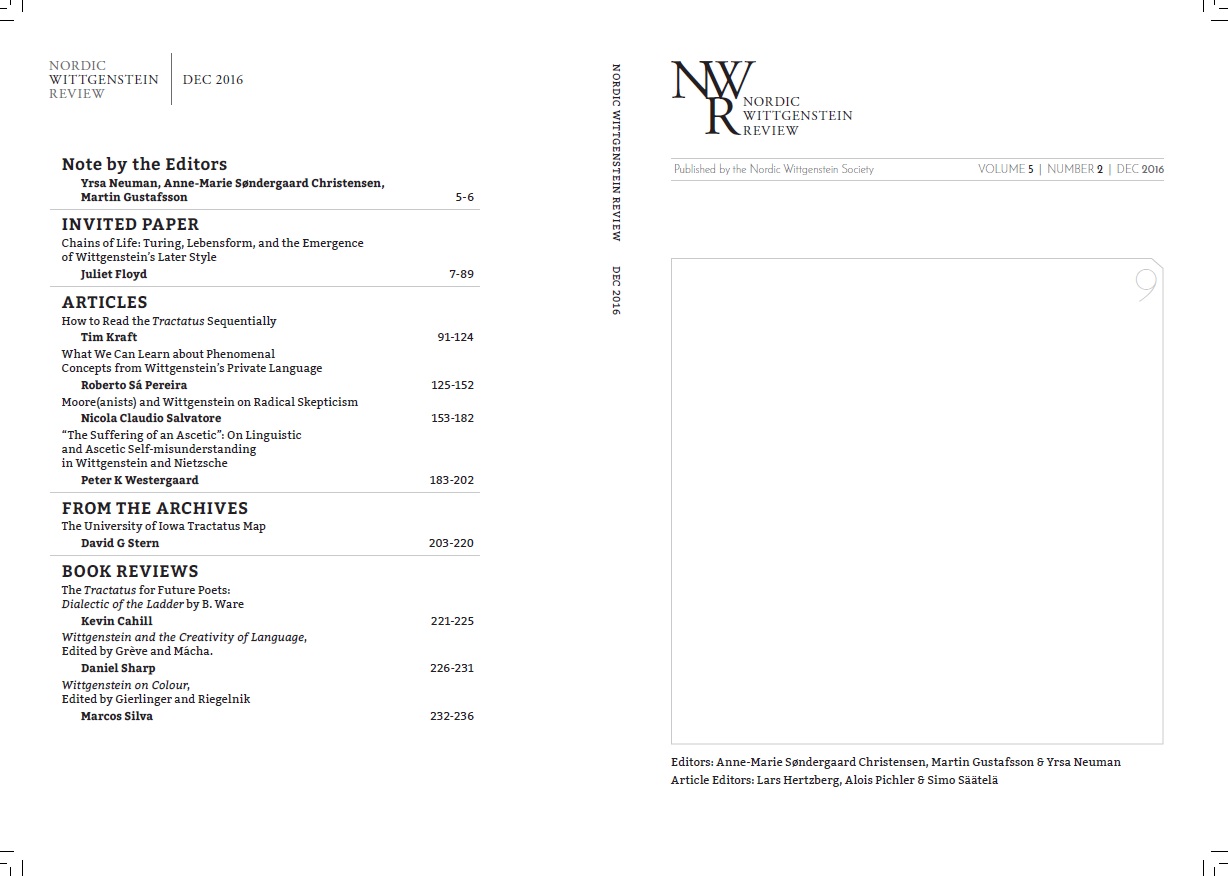“The Suffering of an Ascetic”: On Linguistic and Ascetic Self-misunderstanding in Wittgenstein and Nietzsche
Keywords:
Nietzsche Friedrich, Wittgenstein Ludwig, ascetism, linguistic misunderstandingAbstract
This paper outlines an interpretation of Ludwig Wittgenstein’s remark in the Big Typescript in which he compares the philosopher bewitched by the workings of language to “the suffering of an ascetic”. The interpretation takes as its starting point Friedrich Nietzsche’s terse account of the philosopher, the history of philosophy, and his diagnosis of ascetic self-misunderstanding, from the Third Essay, “What do ascetic ideals mean?”, in On the Genealogy of Morality. In its assumption of an affinity between Wittgenstein’s remark and Nietzsche’s descriptions, and in its analysis, this paper introduces a “method of voice borrowing” to approach the question: “Wittgenstein and Nietzsche?” The juxtaposition of Wittgenstein’s conception of the philosopher’s linguistic self-misunderstanding with Nietzsche’s notion of the ascetic self-misunderstanding leads finally to the question of what is gained by introducing this method, and hence by reading Wittgenstein’s remark on the suffering of an ascetic with the help of Nietzsche’s voice.
References
Baker, G.P. & Hacker, P.M.S., 1988a. Essays on the Philosophical Investigations. Wittgenstein. Meaning and Understanding, Oxford: Basil Blackwell.
Baker, G.P. & Hacker, P.M.S., 1988b. An Analytical Commentary on Wittgenstein’s Philosophical Investigations, Vol. 1, Oxford: Basil Blackwell.
Bearn, G.C.F., 1997. Waking to Wonder. Wittgenstein’s Existential Investigations, New York: State University of New York Press.
Cahoone, L.E., 1995. The Ends of Philosophy, New York: State University of New York Press.
Conway, D., 2008. Nietzsche’s On the Genealogy of Morals, London: Continuum International Publishing Group.
Dobbins, G.R., 1991. The Meaning of Life in the Work of Nietzsche and Wittgenstein, Virginia: UMI. Dissertation Services.
Heller, E., 1988. “Wittgenstein and Nietzsche“. In: E. Heller, 1988. The Importance of Nietzsche. Ten Essays, Chicago: The University of Chicago Press, pp. 141-157.
Heinen, R., 1997. Sprachdynamik und Vernunft. Untersuchungen zum Spätwerk Nietzsches und Wittgensteins, Frankfurt am Main: Verlag Königshausen & Neumann.
Hilmy, S., 1987. The Later Wittgenstein. The Emergence of a New Philosophical Method, Oxford: Basil Blackwell.
Kenny, A., 1984.”Wittgenstein on the Nature of Philosophy”. In: A. Kenny, 1984. The Legacy of Wittgenstein, Oxford: Basil Blackwell.
Leiter, B., 2002. Nietzsche on Morality, London: Routledge.
Majetschak, S., 2005. “Philosophie als Arbeit an sich selbst“. Wittgenstein-Studien 12, pp. 61-78.
Moore, G.E., 1959. ”Wittgenstein’s Lectures in 1930-33”. In:
G.E. Moore, 1959. Philosophical Papers, London: George Allen & Unwin Ltd., pp. 252-324. (MWL)
Mulhall, S., 2005. Philosophical Myths of the Fall, Princeton: Princeton University Press.
Nietzsche, F., 1968. Twilight of the Idols, London: Penguin Books. (TI)
Nietzsche, F., 1988. Sämtliche Werke. Kritische Studienausgabe, Berlin: Walter de Gruyter.
Nietzsche, F., 1994. On the Genealogy of Morality, Cambridge: Cambridge University Press. (GM)
Nietzsche, F., 1997. Daybreak, Cambridge: Cambridge University Press. (D)
Nietzsche, F., 2006. The Gay Science, Cambridge: Cambridge University Press. (GS)
Ridley, A., 1998. Nietzsche’s Conscience. Six Character Studies from the ‘Genealogy’, Ithaca: Cornell University Press.
Ronen, S., 2002. Nietzsche and Wittgenstein. In Search of Secular Salvation, Warsaw: Academic Publishing House DIALOG.
Soll, I., 1994. ”Nietzsche on Cruelty, Ascetism, and the Failure of Hedonism”. In: R. Schacht ed. 1994. Nietzsche, Genealogy, Morality. Essay’s on Nietzsche’s ‘Genealogy of Morals’, Berkeley: University of California Press, pp. 168-192.
Stegmaier, W., 1994. Nietzsches ‘Genealogie der Moral’, Darmstadt: Wissenschaftliche Buchgesellschaft .
Westergaard, P.K., 2009. Nietzsche. “… fra 1888, som år et …“ Et studie i Nietzsches ‘Der Antichrist’ [Nietzsche. ”… from 1888, as year one …” A Study of Nietzsche’s ‘Der Antichrist’], Aalborg: Aalborg Universitetsforlag.
Wittgenstein, L., 1953. Philosophical Investigations, Oxford: Basil Blackwell. (PI)
Wittgenstein, L., 1967. Zettel, Oxford: Basil Blackwell. (Z)
Wittgenstein, L., 1971. Tractatus Logico-Philosophicus, London: Routledge and Kegan Paul. (TLP)
Wittgenstein, L., 2000. Wittgenstein’s Nachlass. The Bergen Electronic Edition, Oxford: Oxford University Press.
Wittgenstein, L., 2001. Philosophische Untersuchungen. Kritisch-genetische Edition, Frankfurt am Main: Suhrkamp Verlag.
Wittgenstein, L., 2013. The Big Typescript: TS 213, Oxford: Blackwell Publishing. (TS 213)
Downloads
Published
How to Cite
Issue
Section
License
NWR uses the Creative Commons license CC-BY.
Vol. 1-3 used CC-BY-NC-SA. The collected works copyright ownership for Vol. 1-2 were shared by Nordic Wittgenstein Society and ontos Verlag/De Gruyter.








